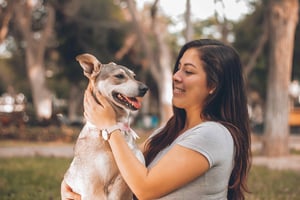Dogs licking is a common behaviour, but it can be annoying when your pup licks you too much. If...
How to Stop Your Dog From Licking
Dogs are naturally affectionate animals, and one of the ways they show their love is through licking. But, if your pup’s licking becomes excessive, it can be annoying and even dangerous. In this article, we’ll discuss how to stop your dog from licking and provide tips on preventing it from happening in the first place.
Understand the Causes of Excessive Licking
Excessive licking can be caused by a number of things, including boredom, anxiety, allergies, and even an underlying medical condition. By understanding the possible causes of your dog’s licking, you can make a plan to address the problem.
Boredom – If your dog is bored, they may lick themselves or items around the house out of boredom. This is a common cause of excessive licking.
Anxiety – If your pup is anxious, they may lick themselves as a way to cope with their feelings of fear or worry. If your dog is anxious, it’s important to identify the source of their anxiety and take steps to address it.
Allergies – Allergies can cause dogs to lick themselves excessively as they try to soothe the itching and discomfort caused by the allergy.
Medical Conditions – Excessive licking can be a sign of an underlying medical condition, such as an infection or parasite. If your pup is licking excessively, it’s important to have them checked out by a vet to rule out any medical issues.
How to Stop Your Dog From Licking
Once you’ve identified the cause of your pup’s licking, you can begin to take steps to stop it. Here are some tips for how to stop your dog from licking:
- Provide Mental Stimulation – If your pup is bored, provide them with toys and activities to keep them busy. This will help keep their mind occupied and prevent them from licking out of boredom.
- Address Anxiety – If your pup is anxious, it’s important to identify the source of their anxiety and take steps to address it. This may include providing them with a safe space, taking them on regular walks, and providing them with calming activities such as massage or aromatherapy.
- Treat Allergies – If your pup has allergies, it’s important to treat them to reduce their discomfort. Talk to your vet about the best way to do this.
- Rule Out Medical Conditions – If your pup is licking excessively, it’s important to have them checked out by a vet to rule out any medical issues.
- Distract Your Dog – If your pup is licking, try to distract them with a toy or activity. This will help them focus on something other than licking.
- Provide Positive Reinforcement – If your pup stops licking when you tell them to, be sure to reward them with praise and treats. This will help reinforce the behaviour you want to see.
Preventing Excessive Licking
In addition to addressing the cause of your pup’s licking, there are some things you can do to prevent it from happening in the first place. Here are some tips for preventing excessive licking in your pup:
- Provide Adequate Exercise – Make sure your pup is getting enough exercise each day. Regular exercise will help keep them physically and mentally healthy, which can help reduce boredom and anxiety.
- Provide Mental Stimulation – Provide your pup with plenty of toys and activities to keep them mentally stimulated. This will help keep their mind occupied and prevent them from licking out of boredom.
- Manage Stressors – If your pup is anxious, it’s important to identify and manage the sources of their stress. This may include avoiding loud noises, providing them with a safe space, and taking them on regular walks.
- Visit the Vet Regularly – Regular visits to the vet will help ensure that any medical issues are identified and treated quickly. This will help keep your pup healthy and reduce the risk of excessive licking.
Conclusion
Excessive licking can be a sign of boredom, anxiety, allergies, or an underlying medical condition. It’s important to understand the cause of your pup’s licking so that you can address it appropriately. There are steps you can take to stop your pup from licking, such as providing them with mental stimulation and positive reinforcement. You can also take steps to prevent excessive licking in the future, such as providing adequate exercise and managing stressors. By following these tips, you can help keep your pup healthy and happy.



